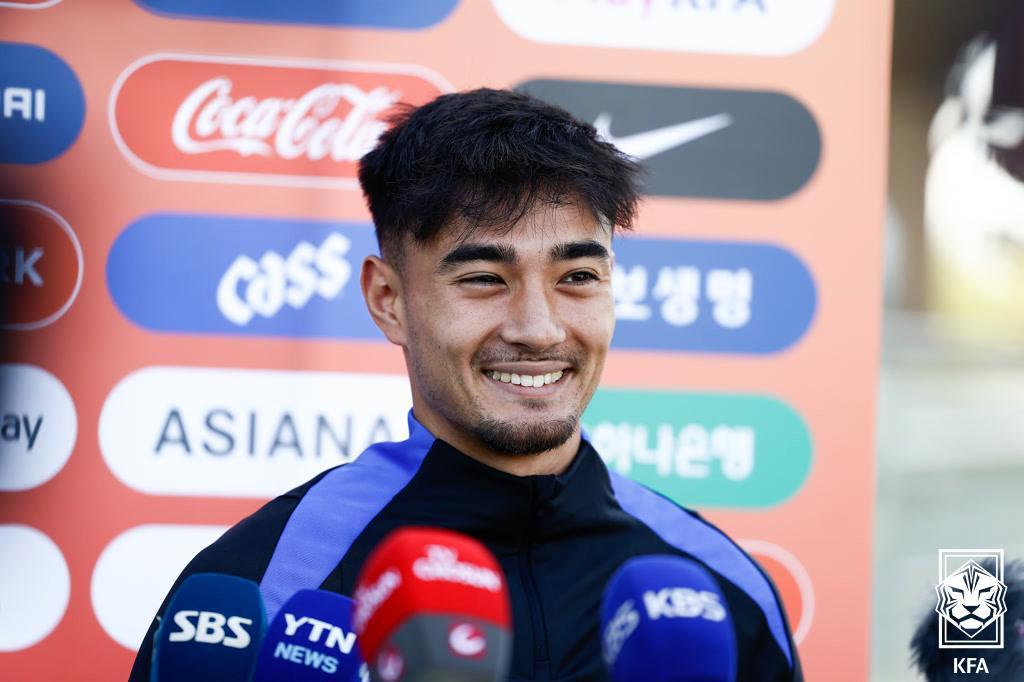Jens Castrop, the first foreign-born, mixed-race player to join Korea’s national football team, ignited debates across Korea’s football fan communities after comments about Korea’s locker room culture, bringing public’s attention to potentially lingering hierarchies in the squad.
Castrop’s interview with Germany’s Kicker, published Monday, spurred headlines questioning whether a “kkondae culture” — a term for outdated, patriarchal seniority — remains alive in Korean football.
Born in Germany to a Korean mother and a German father, Castrop grew up representing his birth country at the junior level. This August, the Borussia Monchengladbach midfielder switched his footballing allegiance from Germany to Korea and his inclusion under coach Hong Myung-bo marked a fresh turn for the Taegeuk Warriors. His versatility, shown in friendly matches against the United States and Mexico, immediately impressed both fans and coaching staff.
“Everyone in Korea is polite. You bow your head when you greet and respect for elders is very strong,” Castrop told Kicker. He went on to describe how “young players board the elevator last, bring fruit for others after meals and wait to leave until everyone finishes eating.”
Jens Castrop, fourth from right, of the Korean national football team receives greetings from his teammates after Korea’s friendly match against the United States at Sports Illustrated Stadium in Harrison, N.J. on Sept. 6. Yonhap
The controversy drew comparisons to the early 2000s, when then-coach Guus Hiddink famously challenged the Korean team’s rigid pecking order during the 2002 FIFA World Cup.
Hiddink’s approach was widely credited with not only helping Korea reach the semifinals but also revolutionizing team culture — breaking traditional age-based hierarchies and prioritizing performance and teamwork.
Now, over two decades later, Castrop’s interview has once again raised the question of whether seniority still trumps merit in Korea’s locker room.
What Castrop saw as simple observations of Korean etiquette quickly became a point of contention among media and fan. Some online users criticized the persistence of hierarchy in the national team, expressing shock that “such rank-based traditions still exist among players who should be equals.”
However, some saw his remarks as a reflection of Korean cultural norms rather than a problem.
Former footballer Chae, 32, said such etiquette was “completely normal” during his playing days and not inherently negative. He added that discipline can strengthen team bonds and bringing fruit to senior is a “typical” in Korea — even beyond the locker room — unless they become excessive or make someone uncomfortable.
“Even in Europe, there’s a subtle hierarchy (between junior and senior athletes). It’s really just a matter of respect for seniors in Korean culture,” he noted.
Football fan Park, 37, echoed Chae’s view, pointing to the media’s “cherry-picking” of Castrop’s comments fueled the controversy further.
Park said he doesn’t support the hierarchy, but believes that “Korean society’s pecking order has faded over the past decades.” He noted that every sports teams have their own rules about seniority, adding, “The bigger problem is making Castrop’s comments more dramatic than they are — he seemed genuinely happy playing in Korea.”
In the interview, Castrop expressed admiration for Korea’s football icon Son Heung-min, calling him “a hero, a great leader who brings the team together.”
“It was amazing seeing him in person after watching him on TV, and you can see why he is respected by all,” the half-Korean half-German footballer said.
He also spoke warmly about visits to Seoul with his mother, describing the city as “breathtakingly beautiful” and shared that his mother is proud of his achievements.

